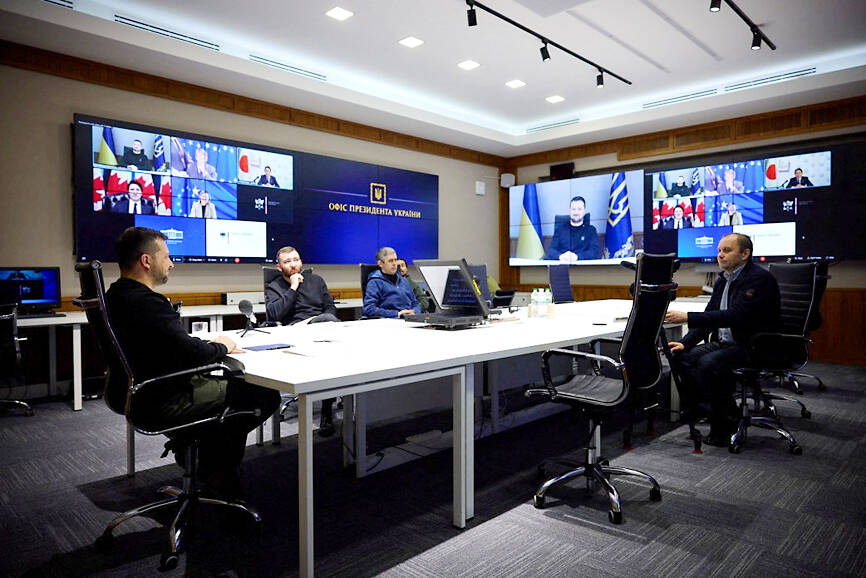Leaders of the G7 in an online meeting on Wednesday underlined the importance of peace and stability in the Taiwan Strait.
G7 leaders, along with Ukrainian President Volodymyr Zelenskiy, met online to address global challenges, including Russia’s invasion of Ukraine and Hamas’ attack on Israel, as well as issues such as economic resilience, food security and health.
“We reaffirm the importance of peace and stability across the Taiwan Strait as indispensable to security and prosperity in the international community,” the body said in a statement.

Photo: Ukrainian Presidential Press Service handout via Reuters
The leaders called for “a peaceful resolution” to cross-strait issues, adding that “there is no change in the basic positions of the G7 members on Taiwan, including stated one China policies.”
Regarding the Indo-Pacific region, they voiced serious concerns about the situation in the East and South China seas, underlining that they “strongly oppose any unilateral attempts to change the status quo by force or coercion.”
They also reiterated the commitment to a free and open Indo-Pacific that is “inclusive, prosperous, secure and based on the rule of law, and that protects shared principles.”
While being open to building “constructive and stable relations with China,” G7 countries urged Beijing to play by international rules, adding that they are to work toward derisking and diversifying to build resilient economies.
The leaders also called on Beijing to honor its obligations under the Vienna Convention on Diplomatic Relations and the Vienna Convention on Consular Relations to refrain from engaging in “interference activities aimed at undermining the security and safety of our communities, the integrity of our democratic institutions and our economic prosperity,” the statement said.
China’s expansive maritime claims in the South China Sea have “no legal basis,” they said, adding that they are opposed to its “militarization activities” in the region.
In Taipei, the Ministry of Foreign Affairs in a statement yesterday thanked the G7 countries for their continued concern about the situation in the Taiwan Strait.
Major countries have repeatedly stressed the importance of peace and stability in the Taiwan Strait, including at the G7 summit in Hiroshima, Japan, in May and the summit between the leaders of Japan, South Korea and the US at Camp David in Maryland in August, the ministry said, adding that the issue has become a consensus in international society.
In other news, Taiwan is to donate US$2 million to the Western Central Pacific Fisheries Commission over five years starting next year to assist in the development of small island nations, the ministry said.
Taiwan made the announcement at the commission’s annual meeting, which began in the Cook Islands on Monday and concludes today, Department of International Organizations Deputy Director-General Lee Kuan-te (李冠德) told a regular news briefing.
The donation is to follow a five-year project from 2017, in which Taiwan donated US$2 million to the commission to establish a trust fund to assist members of the Small Island Developing States, including Taiwan’s diplomatic allies in the Pacific, to build fishery capabilities, Lee said.

EXPRESSING GRATITUDE: Without its Taiwanese partners which are ‘working around the clock,’ Nvidia could not meet AI demand, CEO Jensen Huang said Taiwan Semiconductor Manufacturing Co (TSMC, 台積電) and US-based artificial intelligence (AI) chip designer Nvidia Corp have partnered with each other on silicon photonics development, Nvidia founder and CEO Jensen Huang (黃仁勳) said. Speaking with reporters after he met with TSMC chairman C.C. Wei (魏哲家) in Taipei on Friday, Huang said his company was working with the world’s largest contract chipmaker on silicon photonics, but admitted it was unlikely for the cooperation to yield results any time soon, and both sides would need several years to achieve concrete outcomes. To have a stake in the silicon photonics supply chain, TSMC and

SILICON VALLEY HUB: The office would showcase Taiwan’s strengths in semiconductors and artificial intelligence, and help Taiwanese start-ups connect with global opportunities Taiwan has established an office in Palo Alto, one of the principal cities of Silicon Valley in California, aimed at helping Taiwanese technology start-ups gain global visibility, the National Development Council said yesterday. The “Startup Island Taiwan Silicon Valley hub” at No. 299 California Avenue is focused on “supporting start-ups and innovators by providing professional consulting, co-working spaces, and community platforms,” the council said in a post on its Web site. The office is the second overseas start-up hub established by the council, after a similar site was set up in Tokyo in September last year. Representatives from Taiwanese start-ups, local businesses and

‘DETERRENT’: US national security adviser-designate Mike Waltz said that he wants to speed up deliveries of weapons purchased by Taiwan to deter threats from China US president-elect Donald Trump’s nominee for US secretary of defense, Pete Hegseth, affirmed his commitment to peace in the Taiwan Strait during his confirmation hearing in Washington on Tuesday. Hegseth called China “the most comprehensive and serious challenge to US national security” and said that he would aim to limit Beijing’s expansion in the Indo-Pacific region, Voice of America reported. He would also adhere to long-standing policies to prevent miscalculations, Hegseth added. The US Senate Armed Services Committee hearing was the first for a nominee of Trump’s incoming Cabinet, and questions mostly focused on whether he was fit for the

IDENTITY: Compared with other platforms, TikTok’s algorithm pushes a ‘disproportionately high ratio’ of pro-China content, a study has found Young Taiwanese are increasingly consuming Chinese content on TikTok, which is changing their views on identity and making them less resistant toward China, researchers and politicians were cited as saying by foreign media. Asked to suggest the best survival strategy for a small country facing a powerful neighbor, students at National Chia-Yi Girls’ Senior High School said “Taiwan must do everything to avoid provoking China into attacking it,” the Financial Times wrote on Friday. Young Taiwanese between the ages of 20 and 24 in the past were the group who most strongly espoused a Taiwanese identity, but that is no longer